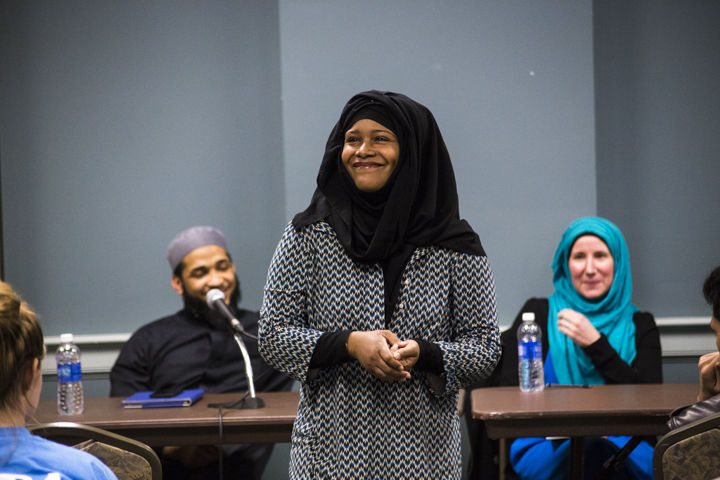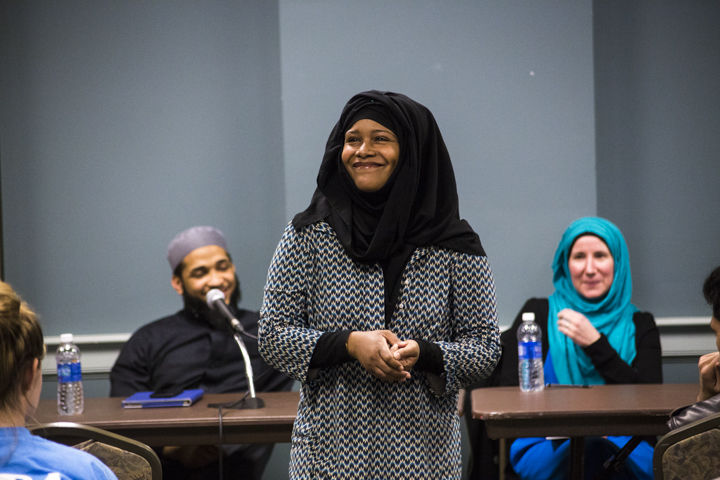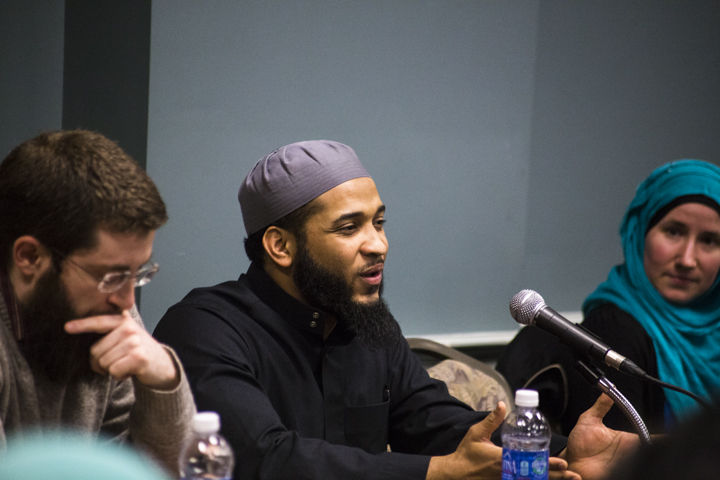When Lauren Schreiber converted to Islam, she had bright blue hair, multiple facial piercings and “interesting clothing.”
Schreiber was working full time at a swimming pool but did not have a swimsuit that was suitable for her new religion. She also released an album of original music that she could no longer promote because the music did not align with Islam.
Schreiber said the social aspects of converting to Islam became less challenging over time because of community support, such as one woman who taught her how to pray and guided her through the conversion process.
“As a community, we have to do better,” Schreiber said. “How many people are out there right now who are just like me who don’t have that person that they can call on to help get them through it?”
About 50 students gathered in the Charles Carroll room of Stamp Student Union on Friday for “Beyond My Story,” a panel discussion about converting to Islam held by the Muslim Students Association.
Beyond My Story is “dedicated to celebrating the identities of our converts,” MSA Vice President Shani Banks said. The senior psychology major converted to Islam two years ago after learning about the religion from MSA events.
“There is a convert community here, and these are our stories, and this is why they’re important, and it’s kind of part of our identity as Muslims,” Banks said.
Mikaeel Smith said he grew up in Buffalo, New York, “lost between drugs and girls and cars.” The imam embraced Islam after he read a Quran at Barnes & Noble, and it was “as if the author was somehow talking to [him].”
Smith urged the audience to support new Muslims and bring the religion to others who are interested. “He doesn’t need a thick book,” Smith said. “He doesn’t need YouTube videos. He or she just needs a brother or sister to drink coffee with, to chill with, to study with. That’s it.”
Anika Ingram, an attorney and Anne Arundel Community College professor, converted to Islam after her two brothers did so. She said she was concerned at first about how clients and students might react when she began wearing a hijab, but now she enjoys engaging with others about Islam.
“Islam for me is something beautiful,” Ingram said. “It’s not something that you wear as a chip on your shoulder, that you’re apologizing for. You don’t apologize for who you are.”
Jennifer Olson, graduate coordinator for interfaith programs and spiritual diversity for the Office of Multicultural Involvement and Community Advocacy, said she grew up in a devout Protestant family and was first exposed to Islam in college. She said she worried about losing her family’s support after she converted.
“My parents made it very clear that they didn’t agree with my decision,” she said. “They were going to argue against it, they were not happy about it, but we were still going to be family.”
Her brother, however, stopped speaking to her. She said it was difficult to deal with her brother’s reaction, but the experience taught her to be patient, negotiate differences and find commonalities with others. In December, Olson said, her brother started talking to her for the first time in two years.
Junior education major Saera Suhail, who was born Muslim, said hearing the panelists’ honest stories could help her answer questions about Islam in the future.
“You never know when you’re in that position where you have a non-Muslim friend who wants to know more about Islam,” Suhail said. “Because I got their firsthand perspective of their journey, maybe that might help me to explain to a potential convert.”
Omar Khan, president of the MSA cabinet and a Muslim, said he wanted to hear different perspectives to understand the convert experience.
Khan, a senior business management major, said he has not experienced discrimination for his religion on this campus, but knows others who have.
“People are usually pretty accepting,” he said. “There’s a lot of misconceptions that people have in their ideas about Islam, so I have always had to deal with that, wherever I was, at the University of Maryland or not, and I think that’s going to continue until we continue to break down these barriers between us.”
Anika Ingram, a lawyer, speaks about her conversion to the Islamic faith at the Muslim Student Association’s Beyond My Story event held in the Charles Carroll Ballroom on Friday, March 27, 2015.
Imam Mikaeel Ahmed Smith speaks about his story regarding his conversion to the Islamic faith at the Muslim Student Association’s Beyond My Story event held in the Charles Carroll Ballroom on Friday, March 27, 2015.





